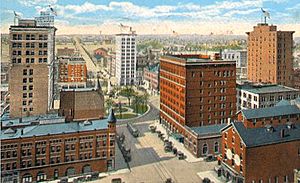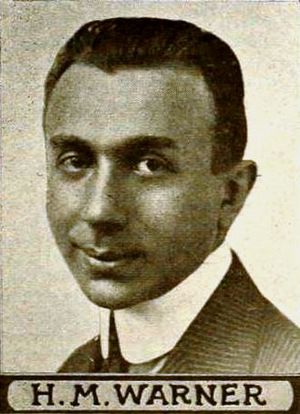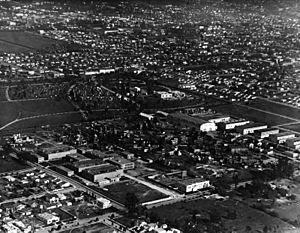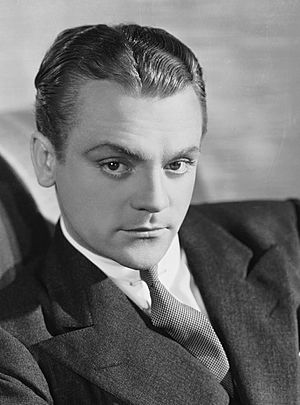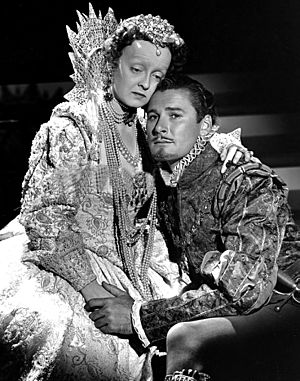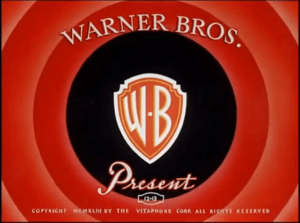Jack L. Warner facts for kids
Quick facts for kids
Jack L. Warner
|
|
|---|---|
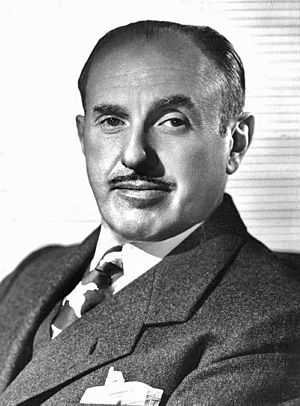
Warner in 1955
|
|
| Born |
Jacob Warner
August 2, 1892 |
| Died | September 9, 1978 (aged 86) Los Angeles, California, U.S.
|
| Resting place | Home of Peace Cemetery, East Los Angeles, California, U.S. |
| Other names | Jack Leonard Warner |
| Occupation | Film executive |
| Years active | 1918–1973 |
| Political party | Republican |
| Spouse(s) |
Irma Claire Salomon
(m. 1914; div. 1935)Ann Page
(m. 1936) |
| Children | 3, including Jack M. Warner and stepdaughter Joy Page |
| Relatives | brothers Harry, Albert, and Sam Warner |
Jack Leonard Warner (born Jacob Warner; August 2, 1892 – September 9, 1978) was a Canadian-American film executive. He was the president and a main leader of Warner Bros. Studios in Burbank, California. Warner's career lasted about 45 years, longer than most other important Hollywood studio leaders.
As a co-head of production at Warner Bros., Jack worked with his brother, Sam Warner, to get the technology for the film industry's first talking picture, The Jazz Singer (1927). After Sam's death, Jack had disagreements with his older brothers, Harry and Albert Warner. He took full control of the company in the 1950s. He secretly bought his brothers' shares after convincing them to sell their stocks together.
Many employees were a bit scared of Warner, and some made fun of his jokes. But he was also respected for his smart decisions and strong will. He brought many top stars to Warner Bros. and supported the realistic dramas the studio became known for. Warner once said, "If I'm right fifty-one percent of the time, I'm ahead of the game."
Throughout his career, Warner seemed like a person with different sides. Even though he was a strong Republican, he supported movies that promoted the ideas of Democratic President Franklin D. Roosevelt. He also spoke out against European fascism and criticized Nazi Germany before America joined World War II. After the war, he was against communism. He appeared before the House Un-American Activities Committee and named screenwriters who were fired because they were thought to be communists. Despite his public image, Warner remained a powerful person in the movie business until he retired in the early 1970s.
Contents
Early Life of Jack Warner
Jacob Warner was born in London, Ontario, Canada, on August 2, 1892. His parents were Polish-Jewish immigrants from a part of Poland that was then controlled by the Russian Empire. They mostly spoke Yiddish. He was the fifth son of Benjamin Warner and Pearl Leah Eichelbaum. His older brother, Hirsch (later Harry), was born in Poland.
The Warner family lived in a difficult world where attacks on Jewish communities were common. In 1888, Benjamin Warner went to the United States to find a better life. He arrived in New York City and called himself "Benjamin Warner." His wife, Pearl, and their two children joined him in Baltimore, less than a year later. Five more children were born in Baltimore, including Abraham (later Albert) and Sam Warner.
In the early 1890s, Benjamin Warner moved his family to Canada. A friend told him he could make a good living trading tin goods for furs. Jack and his brother David were born in Ontario. After two tough years in Canada, the family returned to Baltimore. Two more children, Sadie and Milton, were born there. In 1896, the family moved to Youngstown, Ohio. Harry Warner had already opened a shoe repair shop there. Benjamin worked with Harry until he got a loan to open a meat and grocery store.
Jack spent much of his childhood in Youngstown. He wrote in his autobiography that his experiences there shaped him. He said Youngstown was a very tough city with a lot of crime. Warner claimed he briefly joined a street gang. He also got his first taste of show business in Youngstown, singing in local theaters. He even formed a short partnership with another singer and dancer. During his time in vaudeville, he officially changed his name to Jack Leonard Warner. His older brother Sam didn't like these activities. Sam told Jack, "Get out front where they pay the actors. That's where the money is."
Jack Warner's Professional Career
Starting in Entertainment
In Youngstown, the Warner brothers began their journey into entertainment. In the early 1900s, Sam Warner partnered with someone else and took over the Old Grand Opera House. He used it for cheap vaudeville shows and early movies. This didn't last long. Sam then got a job as a projectionist at Idora Park, an amusement park. He convinced his family about the potential of movies. They bought a Model B Kinetoscope for $1,000. Jack contributed $150 by pawning a horse.
The brothers showed a copy of The Great Train Robbery across Ohio and Pennsylvania. Then they rented an empty store in New Castle, Pennsylvania. This temporary theater, called the Bijou, had chairs borrowed from a local funeral home. Jack, who still lived in Youngstown, came on weekends to sing songs during reel changes.
In 1906, the brothers bought a small theater in New Castle, calling it the Cascade Movie Palace. They ran it until 1907, when they moved into film distribution. That year, the Warner brothers started the Duquesne Amusement Company in Pittsburgh. This company distributed films and made good money. However, Thomas Edison's Motion Picture Patents Company (also known as the Edison Trust) charged very high fees. In 1909, Harry agreed to bring Jack into the family business. He sent Jack to Norfolk, Virginia, to help Sam run another film exchange company. Later that year, the Warners sold their business to the General Film Company for $52,000.
Creating Warner Bros. Studio
The Warner brothers combined their money and started making films in 1910. In 1912, they supported filmmaker Carl Laemmle's Independent Motion Picture Company. This company challenged the monopolistic control of the Edison Trust. That same year, Jack got a job as a film splicer in New York. He helped Sam make the film Dante's Inferno. Even though the film did well, Harry was worried about the Edison Trust. He broke away from Laemmle and sent Jack to start a film exchange in San Francisco. Sam did the same in Los Angeles. The brothers were ready to take advantage of the growing movie market in California.
In 1917, Jack was sent to Los Angeles to open another film exchange. Their first chance to make a big film came in 1918. They bought the rights to My Four Years in Germany, a popular book that criticized German wartime actions. The movie version was a success. The four brothers were able to set up a studio in California. In the new studio, Jack became co-head of production with his older brother, Sam. They found new scripts, managed film production, and looked for ways to cut costs.
Warner Bros. Studios followed My Four Years in Germany with a popular serial called The Tiger's Claw in 1919. That same year, the studio had less success with Open Your Eyes, which featured Jack's only acting role. During this time, the studio didn't make much money. In 1920, the Warners got a bank loan to pay off debts. Soon after, they moved their studio from Culver City, California, to Hollywood. They bought a lot on the corner of Sunset Boulevard and Bronson Avenue, now known as Sunset Bronson Studios. The new location didn't greatly improve the studio's image, which was known for low-budget comedies and daring films.
In 1923, the studio found a trained German Shepherd named Rin Tin Tin. The dog first appeared in Where the North Begins, a film about a lost puppy raised by wolves. Jack was unsure about the project at first. But he changed his mind when he met Rin Tin Tin, who seemed very smart. Rin Tin Tin became the studio's most important money-maker until sound films came along. Screenwriter Darryl F. Zanuck wrote many scripts for Rin Tin Tin movies. For one year, he wrote more than half of the studio's films. From 1928 to 1933, Zanuck was Jack's main assistant and executive producer. He managed the daily production of films. Despite the success of Rin Tin Tin, Warner Bros. couldn't compete with Hollywood's "Big Three" studios: Paramount, Universal, and First National.
In 1925, the studio grew by buying Vitagraph, a theater company in Brooklyn. Later that year, Sam urged Harry to sign a deal with Western Electric. This deal was to develop talking "shorts" using the new Vitaphone technology.
Sam died of pneumonia in 1927, just before the first full-length talking picture, The Jazz Singer, premiered. Jack became the sole head of production. Sam's death made Jack very sad. One writer said, "Throughout his life, Jack had been warmed by Sam's sunshiny optimism, his thirst for excitement, his inventive mind, his gambling nature." Sam had also helped Jack deal with his strict older brother, Harry. In the years that followed, Jack ran the Warner Bros. Burbank studio very strictly. After his brother's death, he became harder to deal with, and many employees didn't like him.
As the family mourned Sam's death, the success of The Jazz Singer helped Warner Bros. become a major studio. Warner Bros. invested only $500,000 in the film but made $3 million in profits. Hollywood's five biggest studios, which controlled most movie theaters, first tried to stop "talking pictures." But Warner Bros. made twelve "talkies" in 1928 alone. The next year, the new Academy of Motion Picture Arts and Sciences honored Warner Bros. for "revolutionizing the industry with sound."
Even with Warner Bros.' new wealth, Jack kept a close watch on costs. He set strict rules for directors and used a simple lighting style to make sets look cheaper.
The Great Depression Era
The studio survived the Wall Street Crash of 1929 quite well. It produced many different types of films, including musicals, biographies, adventure films, and "women's pictures." This variety helped the studio sell films and make about fifty movies a year. Warner Bros. became best known for its tough social dramas, which Jack often supported. These included gangster films like Little Caesar and The Public Enemy. It also included the praised film I Am a Fugitive from a Chain Gang, starring Paul Muni. Some of these films showed a surprising change in Jack's political views. By 1932, even though he had always been a Republican, he openly supported Democratic presidential candidate Franklin D. Roosevelt. He even held a big parade and sports event in Roosevelt's honor. This showed that Warner would start hiring writers who supported Roosevelt's "New Deal" policies.
During this time, Jack actively looked for new talent. To get more "star power" for Warner Bros., he hired actors from rival studios, sometimes offering to double their salaries. This brought three top stars from Paramount: William Powell, Kay Francis, and Ruth Chatterton. In 1929, Jack convinced British actor George Arliss to play the main role in a remake of the 1921 film Disraeli, which was a box-office hit. Then, in 1930, he discovered future stars James Cagney, Joan Blondell, and Frank McHugh in a New York play. Cagney became Jack's biggest star, but also his biggest challenge. They often argued, and Cagney would shout Yiddish curse words he learned growing up. According to a 1937 article, Jack's biggest contract fights were with Cagney, who "got sick of being typed as a girl-hitting mick and of making five pictures a year instead of four."
Zanuck left during a contract disagreement with Harry Warner in 1933. Jack wrote that Zanuck wanted a higher salary and wanted to raise the salaries of actors and staff. That year, Zanuck started Twentieth Century Pictures, which later joined with Fox Film Corporation in 1935. Hal B. Wallis, a long-time producer for the studio, took over as executive producer. However, Jack didn't give Wallis the same power Zanuck had. This led to less central control over creative and administrative decisions, which sometimes caused confusion at the studio. Under the new system, each film had a supervisor, usually a screenwriter. Even though Warner Bros. made many films in the 1930s, some movies had uneven quality. This showed the difficulty of the new system and the spread of authority.
Meanwhile, Jack's role in making films became somewhat limited. After getting a story idea, he often had little to do with a film's production until it was ready to be shown. Still, he could be very harsh with employees and "merciless in his firings." Film director Gottfried Reinhardt said that Jack "enjoyed" humiliating his staff. Jack's management style frustrated many studio employees. Comedian Jack Benny, who once worked at Warner Bros., joked, "Jack Warner would rather tell a bad joke than make a good movie." Jack often argued with actors and supposedly banned them from the studio's executive dining room. He explained, "I don't need to look at actors when I eat."
However, the studio executive did win the affection of a few film stars. One was Bette Davis, a leading star, who once went to England to try and get out of her contract. Davis said that after her child was born, Jack became kind and protective towards her. "We became father and child, no question about it," she said. "He told me I didn't have to come back to work until I really felt like it. He was a thoughtful man. Not many nice things were said about him." Warner also earned the thanks of Errol Flynn. In 1935, Jack personally chose Flynn for the main role in Captain Blood, even though Flynn was unknown at the time. In 1936, after the success of another historical film, The Charge of the Light Brigade, Jack tore up Flynn's contract and signed him to a long-term deal that doubled his weekly salary.
World War II Years
As the 1930s ended, Jack and Harry Warner became very worried about the rise of Nazism. As sons of Polish Jews who had fled their homeland because of persecution, the Warners had a personal reason to show the dangers of Nazism. In 1917, the Warners had already bought the rights to War Brides, a film critical of German militarism. Jack was also deeply affected by the 1936 murder of studio salesman Joe Kaufman, who was killed by Nazi stormtroopers in Berlin. He said, "Like many an outnumbered Jew he was trapped in an alley. They [Nazi thugs] hit him with fists and clubs and then kicked the life out of him with their boots and left him dying there." So, while other Hollywood studios avoided the issue, fearing criticism and losing European markets, Warner Bros. made films that openly criticized Nazi Germany.
In 1939, the studio released Confessions of a Nazi Spy, starring Edward G. Robinson. This film was suggested to Jack by FBI Director J. Edgar Hoover. It was based on the real experiences of an undercover agent. Even though they couldn't use real names, the studio wanted the film to feel very real. Confessions of a Nazi Spy was widely criticized. One critic wrote, "The Warner brothers have declared war on Germany with this one." The German ambassador protested to the U.S. Secretary of State, and Adolf Hitler was very angry after watching the film. The studio also received warnings from a U.S. Congressman about insulting a "friendly country."
At first, the studio gave in to pressure from the Roosevelt Administration and other groups. Jack announced that the studio would not release any more "propaganda pictures" and stopped several anti-Nazi projects. However, over time, Warner Bros. made more films with anti-Nazi messages, including Underground and All Through the Night. In 1940, the studio made short films showing the destruction caused by German bombing raids on London. The studio also celebrated the Royal Canadian Air Force in films like Captains of the Clouds. In 1941, Warner also produced the important war film Sergeant York.
Reports that Jack had banned the use of the German language in the studio were denied. Studio representatives said this would stop many employees from talking to each other.
After America declared war on the Axis Powers, Jack, like some other studio heads, became a lieutenant colonel in the U.S. Army Air Corps.
In 1943, the studio's film Casablanca won the Academy Award for Best Picture. When the award was announced, producer Hal Wallis got up to accept it. But Jack rushed onto the stage with a big smile and took the trophy. Wallis later said, "I couldn't believe it was happening. Casablanca had been my creation; Jack had absolutely nothing to do with it."
Also in 1943, Jack, following President Roosevelt's advice, produced a film version of the book Mission to Moscow. This film was meant to gain public support for the alliance between the U.S. and the Soviet Union. Later, when testifying before the House Un-American Activities Committee (HUAC) in 1947, Jack denied that this film was harmful. He argued that Mission to Moscow was made "only to help a desperate war effort, and not for posterity." After the film didn't do well, the Republican National Committee accused him of making "New Deal propaganda."
Following the Warner brothers' early opposition to Nazism, Warner Bros. made more films about the war than any other studio. They covered every part of the armed services. The studio also produced patriotic musicals like This Is the Army and Yankee Doodle Dandy.
After the War
Warner was not happy about the growing popularity of television in the late 1940s. At first, he tried to compete with TV by using special effects like 3-D films, but these soon lost their appeal. In 1954, Warner finally started working with TV. He provided ABC with a weekly show, Warner Bros. Presents. The studio then made a series of Western dramas, such as Maverick, Bronco, and Colt .45. Warner was used to dealing with actors in a demanding way. Within a few years, he angered new TV stars like James Garner, who sued Warner Bros. over a contract issue. Warner was upset by what he saw as ungrateful TV actors, who seemed more independent than film actors. This made him dislike television even more. After his deal with ABC, Warner also made his son, Jack Jr., head of the company's new television department.
During this time, Warner didn't show much interest in the studio's cartoon department. Characters like Bugs Bunny, Daffy Duck, and Porky Pig were loved by cartoon fans. But they "were always stepchildren at Warner Bros." As writer Bob Thomas said, "Jack Warner...considered cartoons no more than an extra service provided to exhibitors who wanted a full program for their customers." In 1953, during a rare meeting with the cartoon makers, Jack admitted he didn't "even know where the hell the cartoon studio is." Harry added, "The only thing I know is that we make Mickey Mouse," mistakenly referring to Walt Disney Productions' famous character. Several years later, Jack sold all 400 cartoons Warner Bros. made before 1948 for $3,000 each. As Thomas noted, "They have since earned millions, but not for Warner Bros."
Jack's difficult relationship with his brother Harry got worse in February 1956. Harry learned that Jack had decided to sell Warner Bros.' films made before 1950 to Associated Artists Productions for $21 million. "This is our heritage, what we worked all our lives to create, and now it is gone," Harry said. The gap between Jack and Harry grew wider later that year. In July 1956, Jack, Harry, and Albert announced they were selling Warner Bros. But Jack secretly put together a group to buy control of the company. By the time Harry and Albert found out, it was too late. Jack, as the company's biggest stockholder, made himself the new company president. After the deal, he announced that the company would focus more on getting important stories and talent to make the best movies possible.
The two brothers had often argued. Harry never spoke to Jack again. When Harry died on July 27, 1958, Jack did not go to the funeral. He left for his yearly vacation in Cap d'Antibes.
The 1960s and Retirement
In the 1960s, Warner kept up with fast changes in the industry. He played a key role in making films that were successful with both audiences and critics. In February 1962, he bought the film rights for the Broadway musical My Fair Lady. He paid a huge $6.5 million. The previous owner, CBS director William S. Paley, set terms that included fifty percent of the distributor's profits. Despite the high price, the deal was very profitable for Warner Bros., bringing in $12 million in profits. Warner was criticized for choosing Audrey Hepburn, who didn't sing, to play the main role of Eliza Doolittle. Indeed, the 1964 Academy Award for Best Actress went to Julie Andrews, who had played Eliza on Broadway, for Mary Poppins. However, My Fair Lady won the Best Picture Oscar for 1964.
In 1965, Warner surprised many when he bought the rights to Who's Afraid of Virginia Woolf?, a powerful play about a difficult marriage. From the start, the project faced problems. The script was very close to the play and pushed the limits of the U.S. film industry's Production Code. Jack Valenti, who had just become head of the Motion Picture Association of America, felt uneasy about it. He worried this was the start of a difficult new era in film. The film's director also argued with studio executives who wanted the film in color instead of black and white. These arguments soon faded. Warner challenged the Production Code by publicly requiring theaters to put an "adults only" label on the film. This was a marketing trick to get people to see what was so restricted. The MPAA then approved the film as a special exception because of its quality. This led other filmmakers to challenge the Code even more. When it was released, Who's Afraid of Virginia Woolf? was loved by audiences and critics. It received thirteen Academy Award nominations, including Best Picture of 1966.
Despite these successes, Warner grew tired of making films. He sold a large part of his studio stock to Seven Arts Productions on November 14, 1966. Some thought that another executive convinced Warner to sell so he could take over the studio. However, Warner also had personal reasons for wanting to retire. His wife, Ann, kept pushing him to "slow down." The aging studio head felt he needed to get his affairs in order. He sold his 1.6 million shares of stock after producing the film version of Camelot. The sale brought him about $24 million after taxes. Eight months later, Warner joked, "Who would ever have thought that a butcher boy from Youngstown, Ohio, would end up with twenty-four million smackers in his pocket?" At the time of the sale, he was the second studio head to also be company president, after Columbia Pictures' Harry Cohn.
Warner's decision to sell came when he was losing the great power he once had. He had already survived the changes of the 1950s, when other studio heads were forced out by stockholders. Changes in the industry meant that studios would become "more important as backers of independent producers than as creators of their own films." This left little room for the traditional movie mogul. By the mid-1960s, most of the film leaders from the Golden Age of Hollywood had died. Warner was seen as one of the last of his kind. Evidence of his losing control at Warner Bros. included his failure to stop the controversial but important film Bonnie and Clyde, which he initially "hated." Similarly, as producer of the film version of Camelot, he couldn't convince director Joshua Logan to cast Richard Burton and Julie Andrews in the main roles. Instead, Logan chose Richard Harris and Vanessa Redgrave, which contributed to the film's failure. Warner officially retired from the studio in 1969.
After Warner Bros.
Warner remained active as an independent producer until the early 1970s. He helped run some of the company's distribution and exhibition parts. One of his last productions was a film version of a Broadway musical, 1776, released through Columbia Pictures. Before the film's release, Warner showed a preview to President Richard Nixon. Nixon suggested big changes, including removing the song 'Cool, Cool, Considerate Men'. He felt it was a hidden criticism of the Vietnam War. Without asking the film's director, Peter H. Hunt, Warner ordered the film to be re-edited. These cuts have since been put back in most TV showings and on the film's DVD release.
In November 1972, the film opened to excited audiences, but it didn't do well in theaters. With a divided political mood, few Americans were interested in "a cheery exercise in prerepublic civics." Warner's efforts to promote the film sometimes backfired. During an interview, the elderly producer went on a long rant against "pinko communists." This was his only television interview.
Jack Warner's Personal Life
On October 14, 1914, Warner married Irma Claire Salomon. She was from one of San Francisco's early Jewish families. Irma gave birth to their only child, Jack M. Warner, on March 27, 1916. Jack Sr. named the child after himself, even though it was a Jewish custom not to name children after living relatives. Although his son had a different middle initial, he "has been called Junior all his life."
Warner's first marriage ended in 1935 when he left his wife for another woman, Ann Page. They had a daughter named Barbara. Irma sued her husband for divorce, saying he deserted her. Harry Warner showed the family's feelings about the marriage when he said, "Thank God our mother didn't live to see this." Jack married Ann after the divorce. The Warners, who sided with Irma, refused to accept Ann as a family member. Because of this, Warner's relationship with his son, Jack Jr., also became difficult.
In the late 1950s, Warner was almost killed in a car accident. He was in a coma for several days. On August 5, 1958, after playing cards at a casino in Cannes, his Alfa Romeo roadster crashed into a coal truck. Shortly after the accident, Jack Jr. joined other family members in France, where his father was in the hospital. In an interview, Jack Jr. suggested his father was dying. Then, during a visit to his father's hospital room, Jack Jr. offended Ann, whom he largely blamed for his parents' divorce. When Warner woke up, he was furious about his son's behavior, and their "tenuous" relationship ended. On December 30, 1958, Jack Jr. was told by his father's lawyer that he was fired from the company. When he tried to go to work, studio guards wouldn't let him in. The two men never made up, and Jack Jr. is not mentioned in his father's 1964 autobiography.
In 1937, Warner bought a large house in Beverly Hills that he later developed into the Jack Warner Estate. After his death in 1978, his widow, Ann, lived there until she died in 1990.
Jack Warner's Political Views
Jack Warner was a strong Republican. However, he supported President Franklin D. Roosevelt and his New Deal policies in the early 1930s. Later in the decade, he joined those who opposed Nazi Germany. In 1947, he testified as a "friendly witness" for the HUAC. This supported claims of communist influence in Hollywood. Warner believed that communists were behind a month-long strike at the studio in 1946. On his own, he gave the names of a dozen screenwriters who were fired because they were suspected of having communist sympathies. This effectively ended their careers. Former studio employees named by Warner included Alvah Bessie, Howard Koch, Ring Lardner Jr., John Howard Lawson, Albert Maltz, Robert Rossen, Dalton Trumbo, Clifford Odets, and Irwin Shaw. Warner was very angry when actors like Humphrey Bogart and Lauren Bacall went to Washington to speak against the threat to free expression.
Warner publicly supported Richard Nixon in the 1960 presidential election. He paid for newspaper ads to explain why Nixon should be elected. However, after Nixon lost to John F. Kennedy, Warner arranged to attend a fundraiser for the president-elect. A few weeks later, Warner received a call from Kennedy's father. Soon, Warner Bros. bought the film rights for Robert Donovan's book, PT 109, a bestseller about John Kennedy's experiences during World War II. "I don't think President Kennedy would object to my friendship with Dick Nixon," Warner said later. "I would have voted for both of them if I could. You might think this is a form of fence-straddling, but I love everybody." In the late 1960s, he became a strong supporter of the Vietnam War.
Death and Legacy
By late 1973, those close to Warner noticed he was becoming confused. After getting lost in his office building, Warner retired. In 1974, Warner had a stroke that left him blind and weak. Over the next few years, he slowly lost the ability to speak and stopped responding to friends and family. Finally, on August 13, 1978, Warner was admitted to Cedars-Sinai Hospital. He died of heart inflammation on September 9, at 86 years old. A funeral service was held at the Wilshire Boulevard Temple, where many Warner family members belonged. He was buried at Home of Peace Cemetery in East Los Angeles, California.
Warner left behind an estate estimated at $15 million. Most of his property and belongings went to his widow, Ann. However, Warner also left $200,000 to his estranged son, Jack Jr., perhaps to prevent him from challenging the will. After his death, newspaper obituaries told the familiar story of "the four brothers who left the family butcher shop for nickelodeons" and went on to change American cinema. A front-page story in Youngstown, Ohio, his adopted hometown, described how Warner drove a wagon for his father's business when he was only seven years old. The late movie mogul was widely praised for his role in "shaping Hollywood's 'Golden Age'."
Several months after Warner's death, a special tribute was held by the Friends of the Libraries at the University of Southern California. The event, called "The Colonel: An Affectionate Remembrance of Jack L. Warner," brought together Hollywood stars like Olivia de Havilland and Debbie Reynolds, and cartoon voice actor Mel Blanc. Blanc ended the event with Porky Pig's famous farewell, "A-bee-a-bee-a-bee–that's all, folks." In honor of his contributions to the movie industry, Warner received a star on the Hollywood Walk of Fame, located at 6541 Hollywood Boulevard. He is also on Canada's Walk of Fame in Toronto, where he was inducted in 2004.
Warner has been portrayed by several actors in films and TV shows. These include Richard Dysart in Bogie (1980), Ben Kingsley in Life (2015), and Stanley Tucci in Feud (2017).
See also
 In Spanish: Jack Warner para niños
In Spanish: Jack Warner para niños
 | Jewel Prestage |
 | Ella Baker |
 | Fannie Lou Hamer |


